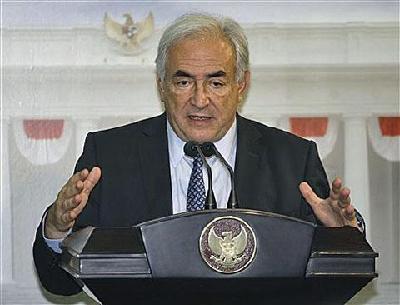
The head of the International Monetary Fund warns that another financial crisis could arise if the international monetary system is not reformed.
IMF chief Dominique Strauss-Kahn said that even though the global recovery is underway, the international monetary system still needs to be reformed.
"Global imbalances are back. Large and volatile capital flows, exchange rate pressures, rapidly growing excess reserves - all this is on the front burner once again. And, I do believe that left unresolved, these problems could even sow the seeds for the next crisis," said Strauss-Kahn.
Panelists, including Fred Bergsten, the director of the Peterson Institute for International Economics, discussed a movement toward developing regional entities that could work with the IMF to prevent future crises.
"I think it's fair to say that Europe's response to its current crisis will lead to the creation of a European Monetary Fund. It probably won't use those words to describe it, but if it walks like a dog, you know, call it a dog," said Bergsten.
Bergsten said the IMF's cooperation with Europe has been exemplary. And he added that Asia also is moving toward something akin to an Asian Monetary Fund, but at a slower pace.
Strauss-Kahn acknowledged that there has been "fair criticism" that the IMF failed to provide an early warning for the global financial crisis. In response, he said, the body has strengthened its surveillance system.
But he also defended the IMF, saying that when it does raise concerns, governments do not want to hear them because governments tend to think in the short term.
"In most cases, what we say is 'we see problems down the road,' but what is 'down the road' for the IMF is a century away on the political timeline," said Strauss-Kahn.
The IMF director also said unemployment levels remain an issue, despite the fact that the global economy is recovering. At present, he said, the United States, North Africa, Europe and elsewhere are dealing with high unemployment rates. But, Strauss-Kahn stated, this will shift in the long term.
"In 10 years or 15 years from now, the real problem of unemployment will be the tens of millions of young people coming [or] trying to come into the labor market in Asia and Latin America and part of the Middle East. So, of course, that's very far away, but we have to face this and to try to build a system that is able to address this kind of problem, too," said Strauss-Kahn.
The panel also discussed the role the IMF's own currency can play in stabilizing the world economy. The IMF's international reserve asset is called the SDR (Special Drawing Rights), and its value is based on a basket of four international currencies - the euro, Japanese yen, pound sterling and US dollar. IMF officials theorize the SDR could facilitate diversification and reduce the impact of exchange rate volatility among major currencies.
surveillance: the act of carefully watching a person suspected of a crime or a place where a crime may be committed (對犯罪嫌疑人或可能發生犯罪的地方的)監視
IMF 'Blind to Crisis' 國際貨幣基金組織受批評
International Monetary Fund debates internal reforms, global economic growth
IMF 'needs reform' to raise more funds
France's Strauss-Kahn chosen to head IMF
(來源:VOA 編輯:崔旭燕)
